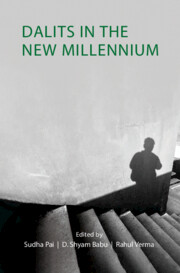Book contents
- Frontmatter
- Contents
- List of Figures
- List of Tables
- Acknowledgements
- 1 Introduction: Dalit Discourse in the New Millennium
- Part I Shifting Patterns of Electoral Politics
- Part II Popular Culture, Discourse, and Protest
- Part III Transformations in Ideology and Identity
- 11 Annihilation, Identity, Representation: Kanshi Ram and the Conundrums of Dalit Political Agency
- 12 Reading Caste and Class Together: A Dalit–Bahujan–Left Alliance?
- 13 Towards Radical Democracy: The Dalit–Bahujan Claim for Political Power
- 14 Liberation Panthers and the Dalit Challenge to Hindutva in Tamil Nadu
- 15 Dalit–Bahujan Politics: Crisis and Future
- Part IV Aspirations and Anxieties
- Part V Discrimination and Representation
- About the Contributors
- Index
12 - Reading Caste and Class Together: A Dalit–Bahujan–Left Alliance?
from Part III - Transformations in Ideology and Identity
Published online by Cambridge University Press: 12 July 2023
- Frontmatter
- Contents
- List of Figures
- List of Tables
- Acknowledgements
- 1 Introduction: Dalit Discourse in the New Millennium
- Part I Shifting Patterns of Electoral Politics
- Part II Popular Culture, Discourse, and Protest
- Part III Transformations in Ideology and Identity
- 11 Annihilation, Identity, Representation: Kanshi Ram and the Conundrums of Dalit Political Agency
- 12 Reading Caste and Class Together: A Dalit–Bahujan–Left Alliance?
- 13 Towards Radical Democracy: The Dalit–Bahujan Claim for Political Power
- 14 Liberation Panthers and the Dalit Challenge to Hindutva in Tamil Nadu
- 15 Dalit–Bahujan Politics: Crisis and Future
- Part IV Aspirations and Anxieties
- Part V Discrimination and Representation
- About the Contributors
- Index
Summary
‘In the swirl of contradictions that envelope India, no other pair of terms has had as baleful a consequence for the politics and future of this country as caste and class,’ wrote Anand Teltumbde. ‘These two words have divided the working-class movement into two camps – movements oriented towards class struggle and those against caste, each driven by the ideological obsessions of their protagonists through divergent paths that led to the eventual marginalisation of both.’ While they have different conceptual horizons, ‘the similarity between the two is enough to build a unified emancipatory struggle – a potential that both these movements have failed miserably to realise’ (Teltumbde, 2018: 91). One can have no quarrel with Teltumbde on the fact that both class-blind caste movements and caste-blind class struggle have reached an impasse in contemporary Indian politics. The parties that fought upper-caste domination are now split and fragile, and the class-based left parties, sequestered as they are, have turned largely ineffective. A serious rethinking of class and caste politics, therefore, is needed to imagine a popular politics as alternative to the hegemonic surge of authoritarian populism in today's India.
The surge is represented by the Bharatiya Janata Party (BJP) with its Hindu majoritarian ideology. This has a telling effect on India's secular constitution, her public institutions, as well as the political space for articulating protest and dissent. For the survival of India's democracy, it is necessary to have an array of counter-hegemonic popular mobilizations which cannot be constituted in the absence of a confluence between two distinct solidarity positions: of the oppressed Dalit and Bahujan castes and of the grossly exploited informal working classes. While Dalit and Bahujan mobilizations had scaled new heights in India's democracy and altered its polity's representational character, they barely breeched the limit of symbolic recognition for marginal social groups. On the other hand, the parliamentary left and the social democratic parties are now faced with a crisis emerging from their inability to move beyond the economic demands of the organized working class and failure to adequately politicize the rural proletariat. The challenge, therefore, is to overcome the extant approaches of both caste and class politics and imagine a concrete possibility for a reciprocal, non-reductive exchange between the two.
- Type
- Chapter
- Information
- Dalits in the New Millennium , pp. 210 - 231Publisher: Cambridge University PressPrint publication year: 2023

